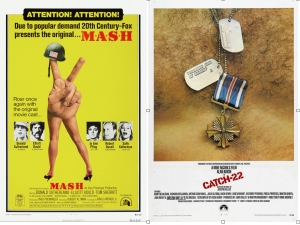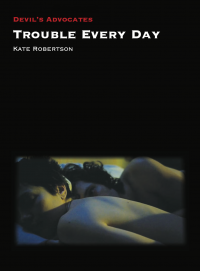




This week on Film at 11 Jeff Godsil pits two ’70s war films against each other, M*A*S*H and Catch-22, while Matthew of KBOO’s Gremlin Time revisits Birdgirl, and in the book corner we look at a new monograph on Claire Denis’s Trouble Every Day, in the Devil’s Advocate series.
––––––––––––––––––––––––––––––––––––––––––––––––––––
Claire Denis is one of those filmmakers favored by film festivals and highbrow movie reviewers. She was mentored by Jaques Rivette and Wim Wenders among others, and eventually fell in with some of the hipster American filmmakers of the ’80s, such as Jim Jarmusch. But her first handful of movies were humanistic, sometimes autobiographical films, often set in post-colonial Africa. They were warmly received by reviewers, including Roger Ebert, a fine reviewer, but the paragon of the middle-brow who rarely disliked anything. Beau Travail is the most well known film, and has the added credentials of being a variation on Herman Melville's Billy Budd.
Then something happened. The traditional style of somewhat distanced or remote European classicism was exchanged for close ups, hand held photography, and stories that taxed patience and taste. Trouble Every Day caused disorientation and rejection at the Cannes film festival, but since then the career recovered, possibly because Denis is canny enough to use big stars and touch on social significance, with chronicles of domestic tensions, crime, and science fiction.
In the Devil’s Advocate monograph on Trouble Every Day, Kate Robertson lays out a case for why the film is important, and I suppose that you could call it a Pauline Kale style position, which argued that audiences at the time avoided the films of Brian DePalma because the viewers weren’t tough enough.
Seen today the film isn't as horrific as all that, just needlessly bloody and difficult to follow. It concerns a couple on a Parisian honeymoon, which is used as a cover by the husband to track down an old colleague, who was working on a cure for a virus that turns its victim into a sexually aroused cannibal. The story also tracks the colleague, whose wife is usually locked up, but occasionally escapes, and he has to clean up after her.
Anyway, this narrative you come up with after the fact, because the director and writers eschew the tradition of clarity and logical character motivation. Its gimmick on the other hand, puts one in mind of the hard-core adult film, Cafe Flesh, which has a similar premise. Other movie quotes include a green scarf, floating over Paris, borrowed from The Bride Wore Black, and a vigorous burst of lust from Body Heat. The film certainly isn't as bad as a typical David Cronenberg, body horror excursion, or something like A Serbian Film or any number of button-pushing Italian cannibal thrillers.
Such films are difficult to watch, and the question remains, are they worth watching at all. Here is Kate Robertson’s assessment, from the end of the book:
“Trouble Every Day is a difficult, unflinching film, but one that is narratively and stylistically stimulating. Close exploration of its assembly of images reveals a broad range of visual, literary and non-fiction references. It is part of a lineage of genre cinema, a film that challenges the audience.There are manifold reasons why it was so poorly received – its cross-genre art/horror classification, graphic violence, expectations of Denis as a filmmaker and of cinema more broadly. The quiet, cold aesthetic is a surface which barely hides an overwhelming weight of feeling and history.The hypnotic images of bodies plunge the viewer into its depths of anxiety, desire and dangerous urges. Trouble Every Day lends itself – even requires – repeated viewing, in order to push through the layers, much like Core and Shane excavate the body. But, the inside is already on the outside. Ultimately, there are no definitive answers to the questions the film asks. It offers no catharsis, leaving the viewer with a lingering sense of unease. Trouble Every Day is a profoundly uncomfortable experience which leaves its mark, like June’s bruise. Its lasting impact on viewers, the way that the film lingers, not just for hours but years, is a sign of great filmmaking.”
I would be the last person to judge a movie against its rough edges. This is what happened with the poetry of Thomas Hardy, of which many contemporary writers thought the work was incompetent and poorly constructed. Without a sympathy for a certain crudity, we wouldn't be able to enjoy the cinema of Samuel Fuller, or Roger Corman, or find hidden auteurs within genres such as the western, the musical, or film noir. But these filmmakers had basic skill, and the rough edges are simply budgetary. Edgar G. Ulmer knew how to make a movie, he simply lacked the time or the resources to smooth the gaps generally invisible in studio movies.
But aren’t the ambiguities and ellipses and erratic acting. In Clair Denis really just a example of insufficient writing skills and bad or pretentious filmmaking? An informative contrast to Clair Denis is Catherine Breillat, who is about the same age, and also likes to push the boundaries of what traditional taste finds comforting in a mass appeal movie, and in such films, as Romance and Fat Girl, among some 20 feature films, the director also adheres to the invisible demands of coherence, motivation, and where to put the camera, and where to make the edit.
- KBOO


